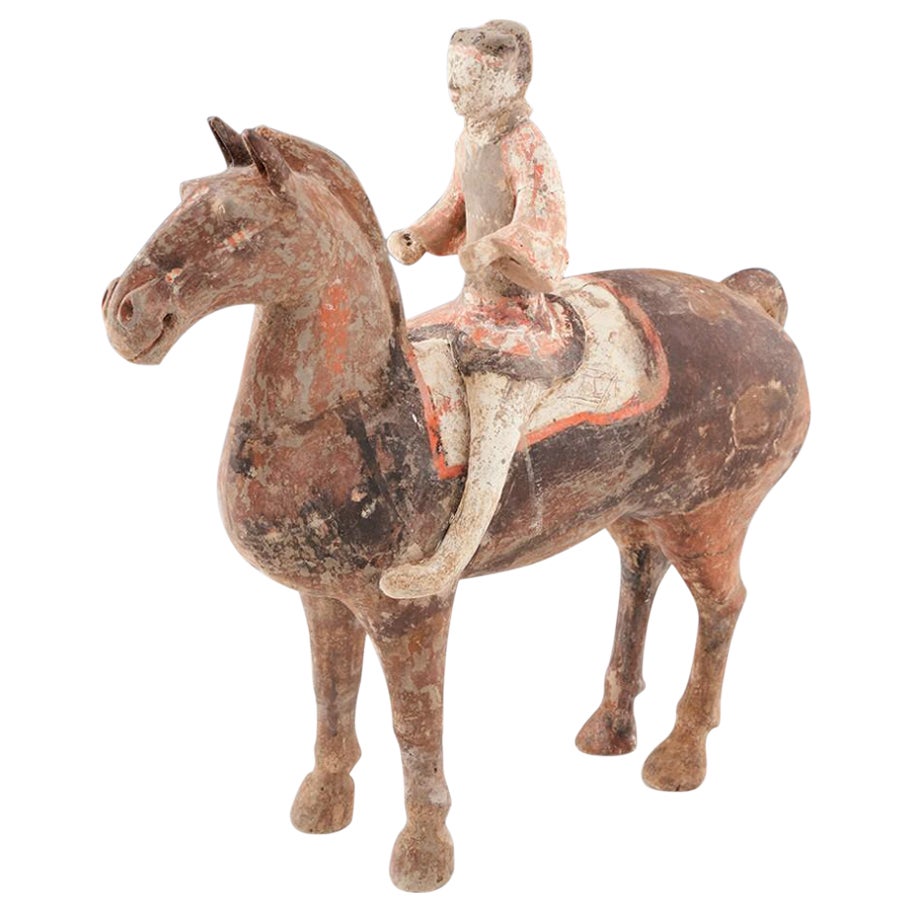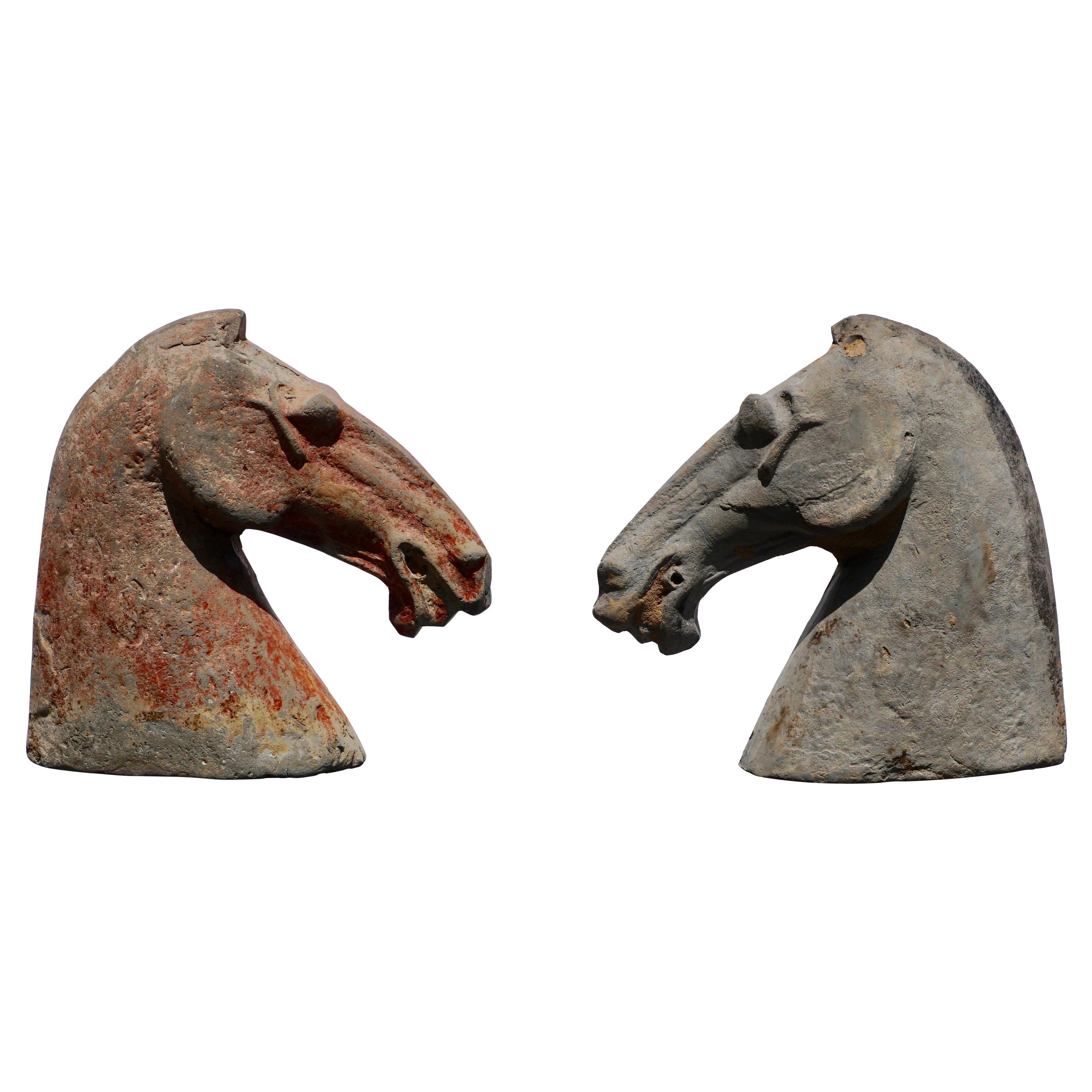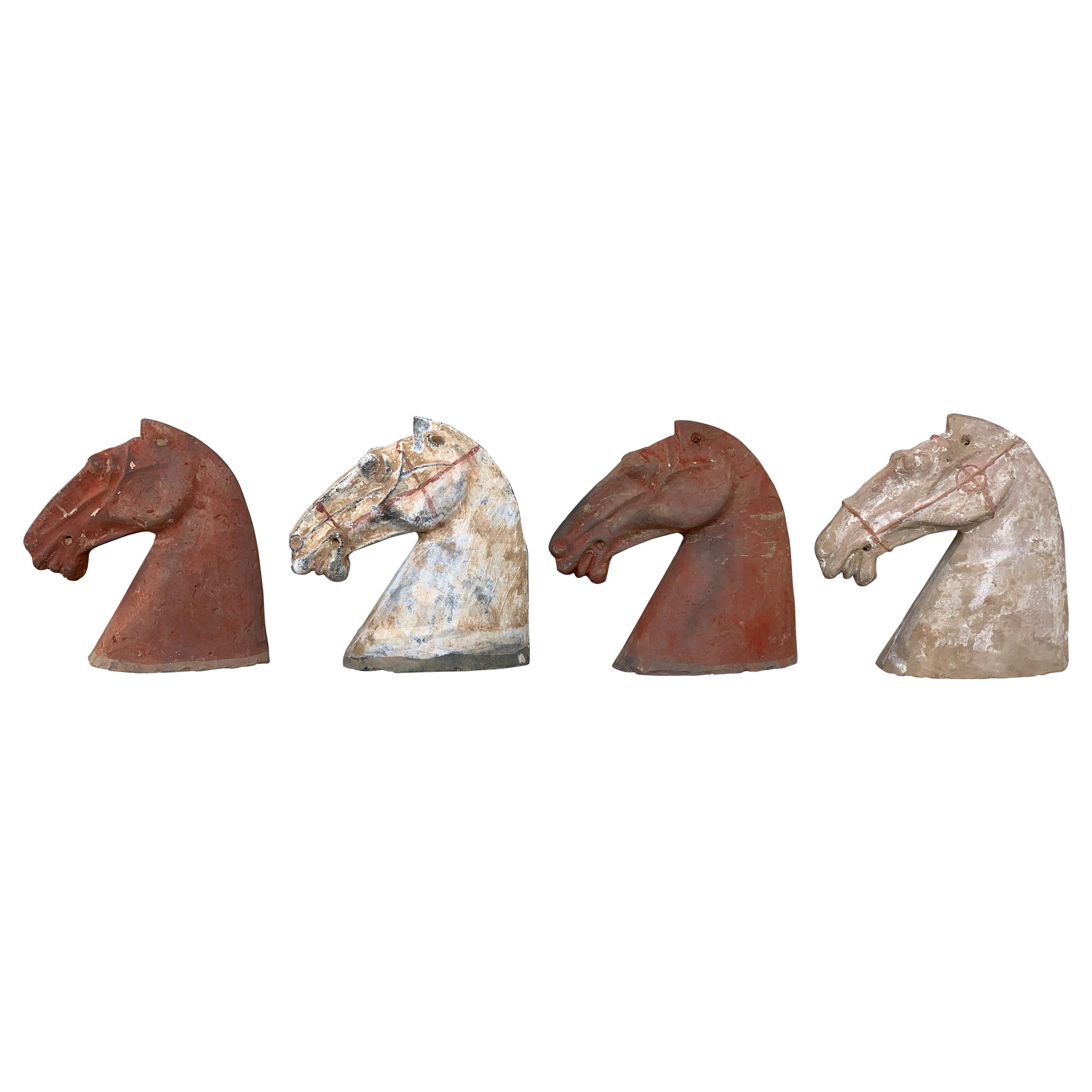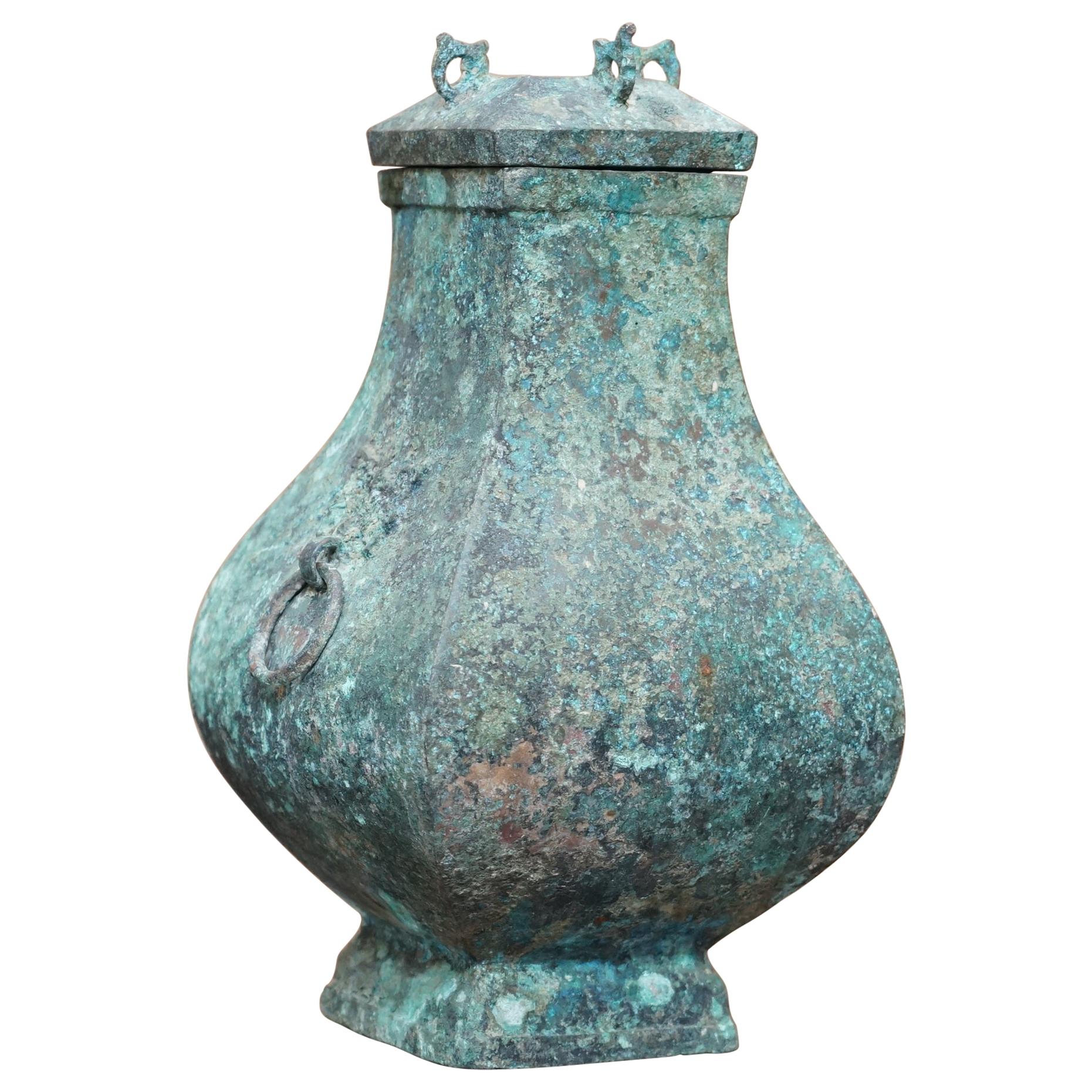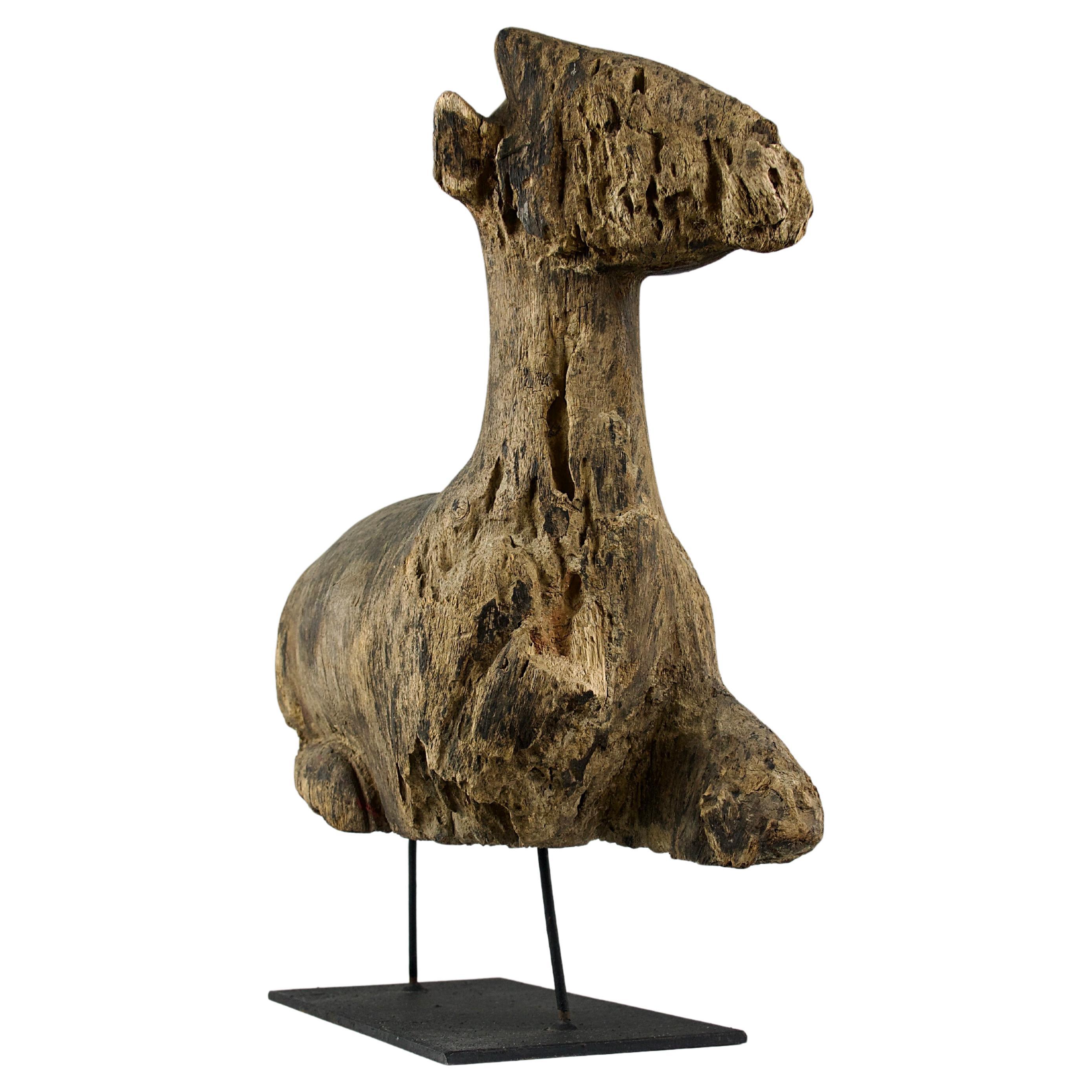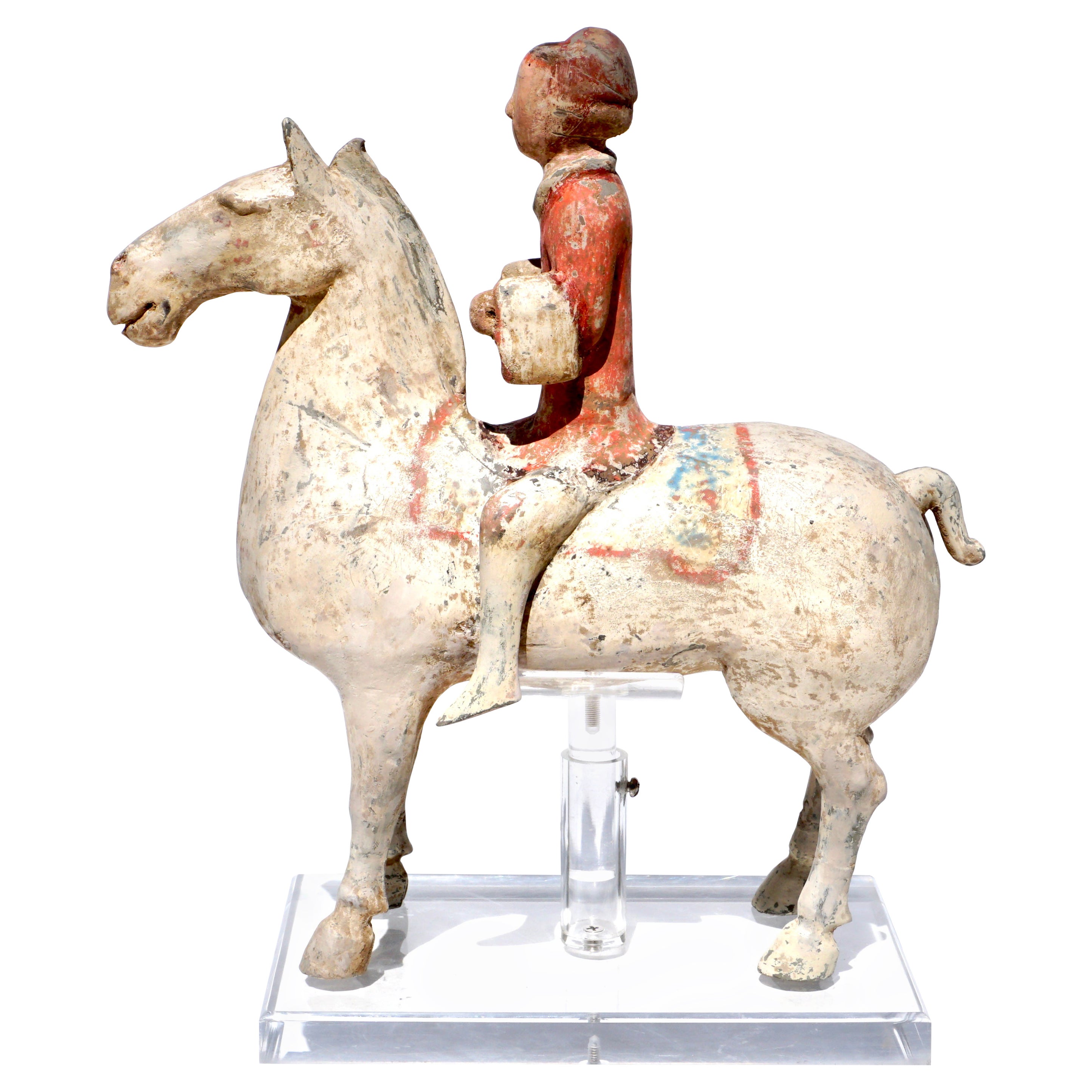Items Similar to Han Dynasty Horse Sculpture, 206BC- 209 AD
Want more images or videos?
Request additional images or videos from the seller
1 of 9
Han Dynasty Horse Sculpture, 206BC- 209 AD
About the Item
Han Dynasty Horse Sculpture, 206BC- 209 AD
It is interetsing to note the position of the riders feet. They are gripping the shoulder of the horse. Double riding stirrups were not used in China until the 4th century when the deployment of cavalry came to dominate Chinese warfare. There was a long standing myth in China that the hose was related to the dragon.The Han dynasty encouraged equine husbandry one can only asume that this was to increase agricultural capacity and military strength.Horse stealing became punishable by death such was their elevated status.
The horse was also introduced into worship practices and ceremony. Please note the very strong brow on this horse and the dragon like head.
This is less refined than the beautifully sculpted Tang dynasty horses that are remarkably elegant with accurate physical attributes. In the Tang dynasty of legs of pottern horses were reinforced. The earlier han dynasty period examples were not and the legs have almost invariably been cracked and restored.
May we extend our thanks to John and also Joe Hongxing whose expertise on this matter has been invaluable.
Additional Information:
Heading: A Han Dynasty Horse
Date : 206BC to 209AD
Period : Han Dynasty
Marks : None
Origin : China
Colour : Grey pottery. Some of the cold painted colour remains.The remnants of black paint remain on the horse and a white saddle with red trim. The rider had a red embroidered jacket with cream cuffs and boots.
Features : The horse is standing four square with ears pricked. There is a piercing in the horses mouth and the riders hands are raised. These too have piercings that would have held leather reins
Size : 29 H cm
Condition: Very Good. The painted face is still remarkably detailed after 2000 years
Restoration : The front right leg and rear left leg have been restored
Provenance: The former property of an English Lord
Reference :
See Christies Fine Chinese Ceramics and Works of Art 6th November 2018 Lot 11
- Dimensions:Height: 11.42 in (29 cm)Diameter: 11.03 in (28 cm)
- Style:Han (Of the Period)
- Materials and Techniques:
- Place of Origin:
- Period:
- Date of Manufacture:206 BC- AD 209
- Condition:Repaired: The front right leg and rear left leg have been restored. The painted face is still remarkably detailed after 2000 years. The front right leg and rear left leg have been restored.
- Seller Location:Tunbridge Wells, GB
- Reference Number:
About the Seller
5.0
Gold Seller
These expertly vetted sellers are highly rated and consistently exceed customer expectations.
Established in 2014
1stDibs seller since 2023
33 sales on 1stDibs
Typical response time: 5 hours
- ShippingRetrieving quote...Ships From: Tunbridge Wells, United Kingdom
- Return PolicyA return for this item may be initiated within 30 days of delivery.
More From This SellerView All
- Han Dynasty Horse Sculpture, 206 BC- 209 ADLocated in Tunbridge Wells, GBHan Dynasty Horse Sculpture, 206 BC- 209 AD It is interetsing to note the position of the riders feet. They are gripping the shoulder of the horse. ...Category
Antique 15th Century and Earlier Chinese Animal Sculptures
MaterialsPottery
- Pavel Hlava Head Sculpture, 1994By Pavel HlavaLocated in Tunbridge Wells, GBPavel Hlava Head Sculpture, 1994 Pavel Hlava is renowned for using the medium of glass for sculpture. Many of these are made up of cut and polished geometric segments of coloured ...Category
20th Century Czech Figurative Sculptures
MaterialsArt Glass, Blown Glass, Glass
- Stoneware Sphere Sculpture by Lies Cosijn, c1972By Lies Cosijn 1Located in Tunbridge Wells, GBStoneware Sphere Sculpture by Lies Cosijn, c1972 Mark Hill Comments : The body and parts of the neck are decorated with a wealth of geometric symbols applied with a brush by hand in a dark brown glaze that resembles ink. They resemble runic symbols or an abstract alphabet...Category
20th Century Dutch Abstract Sculptures
MaterialsStoneware
- A Bow Porcelain Figure of a Turkish Dancer, c1765By Bow PorcelainLocated in Tunbridge Wells, GBA Bow Porcelain Figure of a Turkish Dancer, c1765 Additional information: Date : c1765 Period : George III Marks : Unmarked. Label for Albert Amo...Category
Antique 18th Century English George III Figurative Sculptures
MaterialsPorcelain
- A Bow Porcelain Figure of a Female Turkish Dancer, c1765By Bow PorcelainLocated in Tunbridge Wells, GBA Bow Porcelain Figure of a Female Turkish Dancer, c1765 Additional information: Date : c1765 Period : George III Marks : Unmarked Origin : Bow, ...Category
Antique 18th Century English George III Figurative Sculptures
MaterialsPorcelain
- A Bow Porcelain Figure of Winter, c1765By Bow PorcelainLocated in Tunbridge Wells, GBA Bow Porcelain Figure of Winter, c1765 Have named this version of winter "Dave" in tribute to the great and sorely missed observational Irish comedian Dave Allen. Additional information: Date : c1765 Period : George III Marks : None Origin : New Canton factory...Category
Antique 18th Century English George III Figurative Sculptures
MaterialsPorcelain
You May Also Like
- Pair of Han Dynasty Horse Heads (206BC - 220AD) AttributedLocated in Dallas, TXPair of Chinese Han dynasty horse heads Han dynasty (206 BC-220 AD) earthenware gray pottery Each approx.: 6.25 inches high. 6.5 inches wide. 2...Category
Antique 15th Century and Earlier Chinese Han Animal Sculptures
MaterialsPottery
- Pair of Red Sculpture Han Dynasty Gray Pottery Horse Heads '206BC-220AD'Located in Miami, FLPair of Chinese Han dynasty horse heads Han dynasty Style (206 BC-220 AD) earthenware gray pottery Each approximate measures: 6 inches high. 6...Category
Mid-20th Century Chinese Han Sculptures and Carvings
MaterialsTerracotta
- Fanghu Han Dynasty 206BC-220AD Chinese Bronze Ritual Wine Vessel Jug & CoverLocated in GBWe are delighted to offer for sale this exceptionally important and highly collectable museum quality original Chinese bronze ritual wine vessel and...Category
Antique 15th Century and Earlier Chinese Han Antiquities
MaterialsBronze
- Han Dynasty, Laying Doe Wood Sculpture, China 100ADLocated in PARIS, FRSuperb sculpture of a laying doe from the Chinese Han Dynasty (206BC-220AD). Remainders of polychromic paint, namely red, symbol of good fortune and joy as well as the season of summer, and green, symbol of vigor and vitality and the season of spring. Mounted on base. Condition seen in pictures. Dimensions in cm ( H x L x l ) : - Sculpture : 35 x 40 x 10 - With base : 45.5 x 44 x 15 The Han Dynasty ruled China from 206 B.C. to 220 A.D. and was the second imperial dynasty of China. It is known for its promotion of Confucianism as the state religion and opening the Silk Road trade route to Europe, permanently altering the course of Chinese history. Han Dynasty art and inventions like paper still influence the world today. From the Han Dynasty to the present, deer can be found in many materials and media—rock crystal, nephrite, ink on paper, porcelain, cloisonné enamel, jade, bamboo root, textile, bronze, etc.—alone or in groups, among trees and rocks and in various positions. They appear on everyday objects, from boxes to incense burners, incense holders, lamps, mirror holders and the droppers scholars used when they wrote. A symbol of longevity and grace in Chinese mythology, the word deer is pronounced lu, a homonym for emoluments—favors granted to officials. They therefore represent wealth, nobility and success in imperial examinations (civil service exams for selecting candidates for the state bureaucracy in Imperial China). Deer were the faithful companions of Shu Lao, the god of longevity, and the goddess Magu. They were reputed to live long and to be the only creature able to find the mushroom of immortality, linghzhi. Although its spots are different, deer are sometimes confused or associated with stags, a Manchu hunting trophy whose antlers served to make prestigious furniture. (La Gazette Drouot, Claire Papon) For the colours found on this piece, in Chinese culture, red symbolizes good fortune and joy. Green, symbolizes the spring when everything is brimming over with vigor and vitality. The Han Dynasty (206 B.C. to 220 A.D.) continued the Qin Dynasty’s use of dark colours, but incorporated red. During the earlier years, or Western Han Dynasty, ordinary people wore red while court dress was black. Shoes were red in color. The clothing worn for sacrificial rites was black edged with red. In the later Eastern Han Dynasty, red symbolized the dynasty’s “fire Virtue” and became predominant. Court dress was red. Sacrificial rites called for a red-edged white layer under robes with red socks...Category
Antique 15th Century and Earlier Chinese Han Mounted Objects
MaterialsWood
- Han Dynasty Pottery Horse and RiderLocated in Dallas, TXHan Dynasty painted pottery horse and rider A Chinese Han Dynasty painted pottery horse & rider. Made from grey pottery and cold-painted in white, red and black pigments. The rider dressed as a warrior and in the pose of holding reins for the horse. Comes with a custom sturdy lucite stand. Measures: Height: 13.5 inches (33cm). Length: 13 inches Depth: 5 inches Han Dynasty (206 BC – AD 220). Condition: Very good with past restoration to legs. The great influence of the horse throughout the history of China can...Category
Antique 15th Century and Earlier Chinese Han Animal Sculptures
MaterialsPottery
- Han Dynasty Polychromed Horse and RiderLocated in Dallas, TXA fine Han dynasty polychrome painted terracotta horse and rider. The warrior is dressed in orange and black on a black horse. Measures: Height 14 inches (35 cm) Width 12.5 inches (32 cm). Condition: Excellent with tastefully undetectable repairs. During the unification of China under the Han dynasty, bands of mounted nomadic warriors from the north threatened the country. In order to thwart their attacks, the Chinese sought to import stronger, faster steeds from Central Asia (as opposed to the Mongol ponies used by the invaders), eventually leading to the creation of the Silk Road. This small sculpture of a mounted soldier reveals the crucial military role of the horse. When compared to the diminutive stature of the rider, the importance of the horse becomes readily apparent. This creature provided security and strength, allowing the empire to secure its borders and expand its influences across Central Asia. The magnificent regalia of the horse, including a brilliantly painted saddle in red and green/gold, reflect the respect this animal received. The warrior as well is gorgeously decorated with a painted red tunic and gray chest...Category
Antique 15th Century and Earlier Chinese Han Figurative Sculptures
MaterialsTerracotta
Recently Viewed
View AllMore Ways To Browse
Decorative Riding Boots
Dragon Rider
Chinese Dynasty Jackets
L Riche
Pedro Friedeberg Gold Hand Chair
Tiffanys Deer
Leather Wrapped Giraffe
Animal Study
Decorative Bird Plates
Dog Sculpture Porcelain
Art And Bulldog
Birds Of Murano Glass
Striper Fish
French Bird Figurines
Archimede Seguso Birds Of Murano Glass
Pair Of Staffordshire Lions
Antique Swan Sculpture
Pair Of Horse Statues
